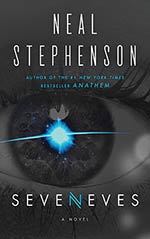
![]() nottheone
nottheone
12/26/2016
![]()
Compared with other Stephenson books, Seveneves is a bit lacking in the humor and thrills department, but it makes up for these by being chock-full of amazingly cool technology, genetic engineering and social science futurism. I could definitely feel the influence of the Hieroglyph project here, as Stephenson rolls out idea after idea about how humans will use technology in the not-so-distant future to do things like survive in outer space, preserve the human genome and engineer a society that can survive in the most restrictive environments.
Knowing that Stephenson is capable of creating fascinating characters and riveting action sequences, it is surprising that here he settles for literal caricatures (one protagonist is a barely-disguised knock-off of Neil DeGrasse Tyson) and really long, boring explanations of such scientific precision that I felt like I was reading a NASA technical manual at points.
About two-thirds of the way through, I was (horror!) thinking of not finishing the book. This is incredible, because normally I love Stephenson, but I was really getting bored. As I sometimes do when faced with this type of decision, I read some reviews on GoodReads. Interestingly, nearly every review mentioned that the book is divided into two distinct sections: the first two-thirds, all about the generation of humans immediately after the disaster; and the second one-third, which skips forward about 5,000 years and describes the ultimate results of the decisions made by the original survivors. Judging by the reviews, people who liked the first two-thirds hated the second part, and vice-versa. I decided to keep reading, and I am glad I did. I very much enjoyed the second part of the book, which was much more uplifting, faster and more interesting in my opinion.
This is "Big Idea" science fiction, something we don't get enough of in these days where most authors seem to only be interested in returning humanity to post-apocalyptic Dark Ages of death and destruction.
[I listened to this as an audio book, which clued me in that the title is pronounced "Seven Eves," in itself a bit of a spoiler. The first section was read by Mary Robinette Kowal, whose performance I found a bit lackluster. The second section was read by Will Damron, who gave the story a needed boost. I listened to the whole thing at 1.25 speed, which improved the experience.]